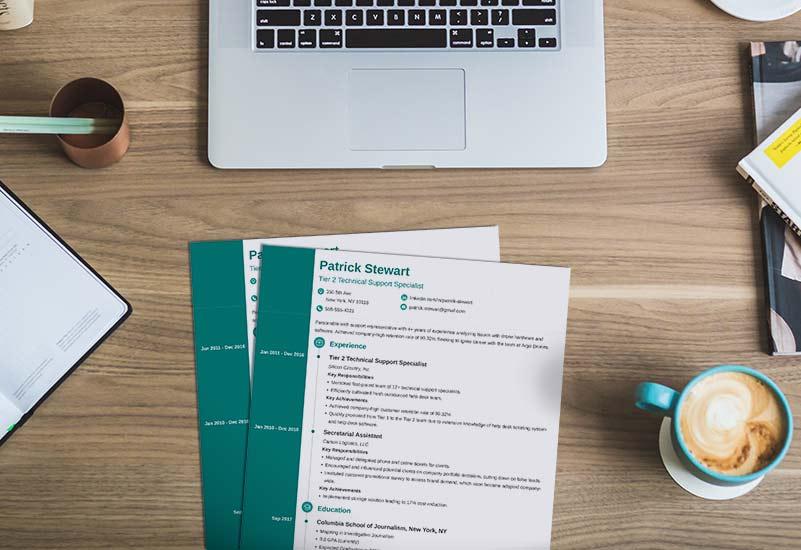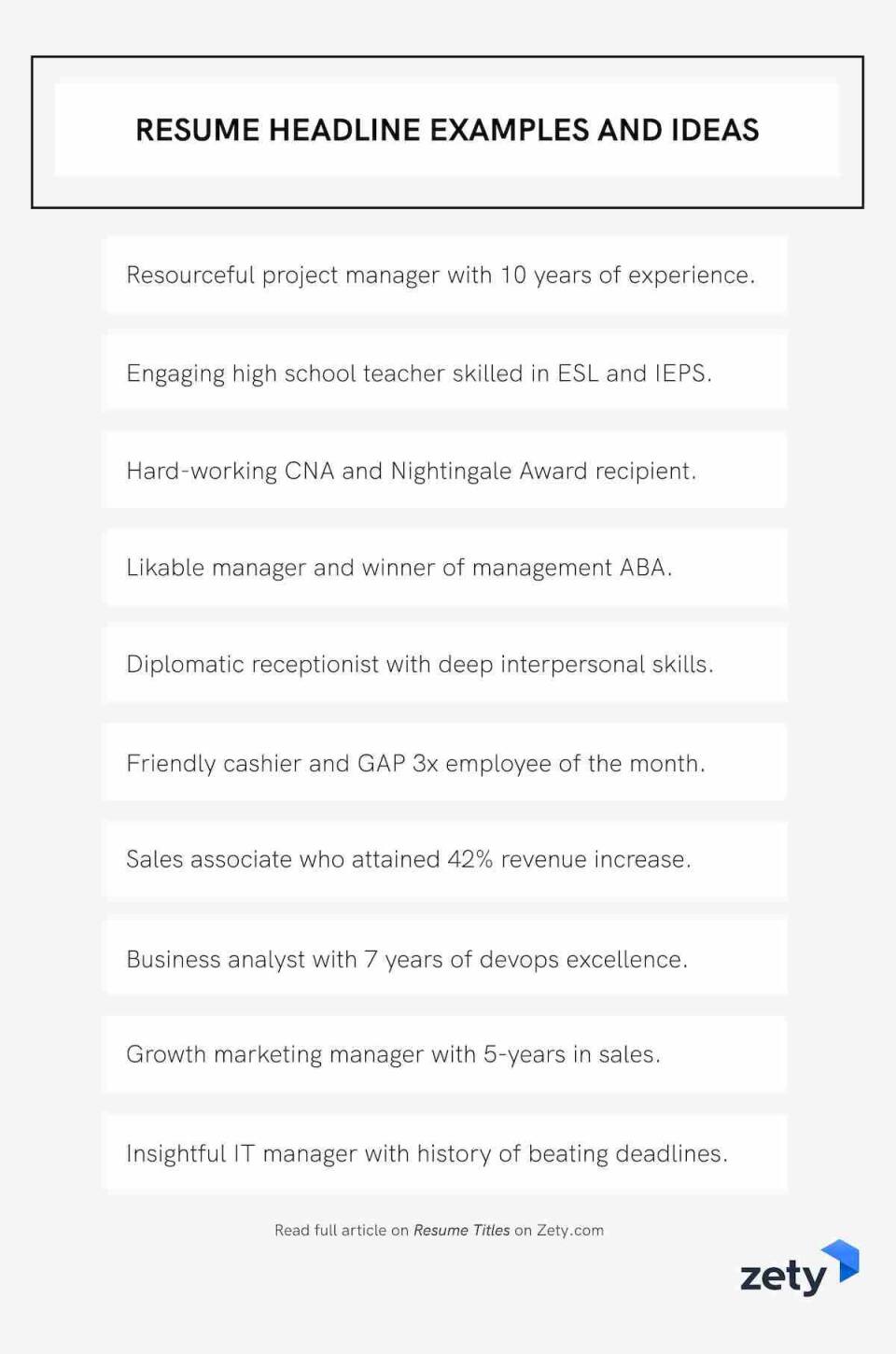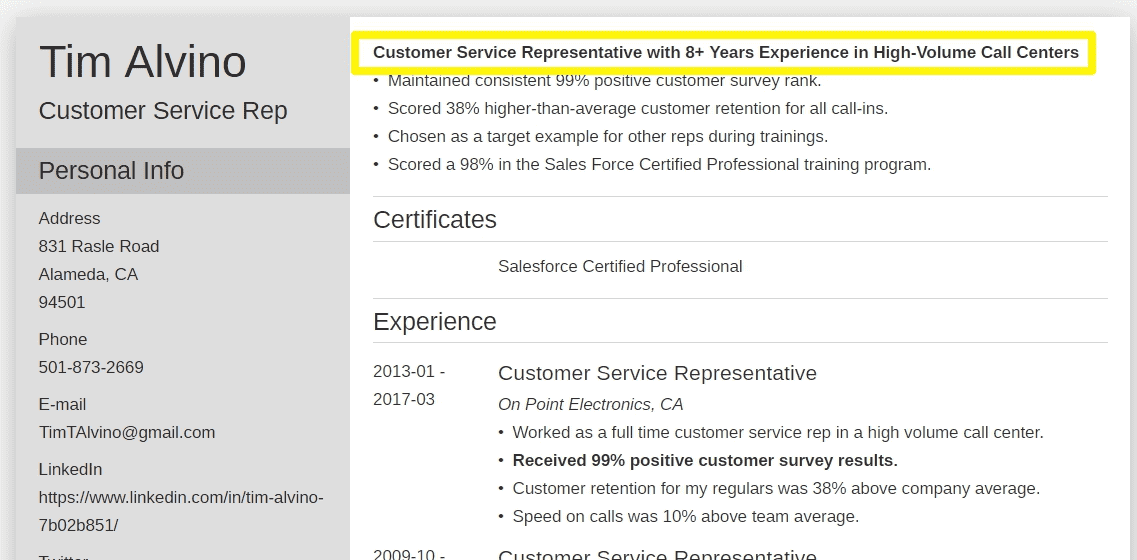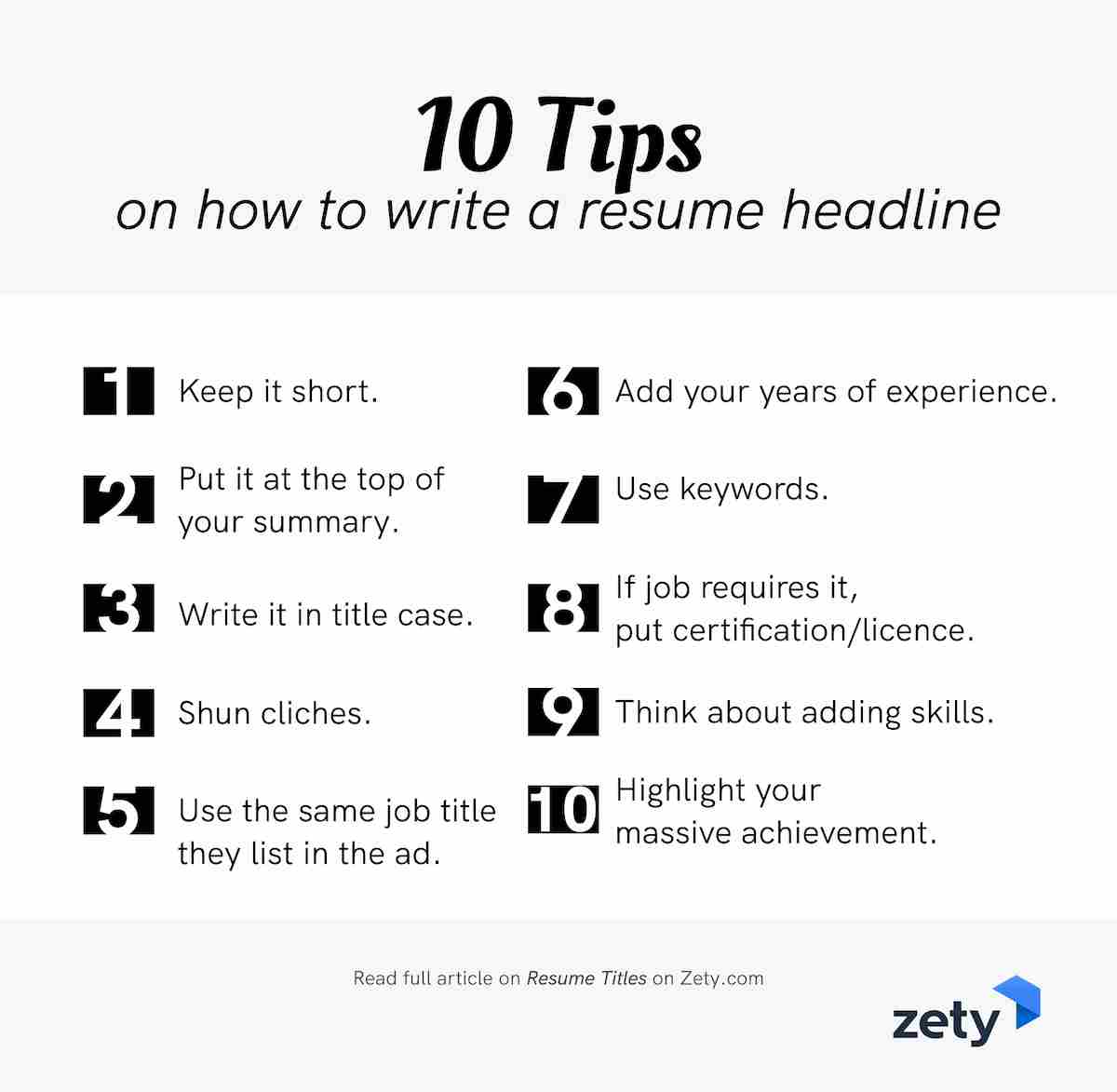
Best Resume Templates for 2023 (14+ Top Picks to Download)
The best resume templates aren't just about fancy looks. They have to be sleek and professional. Their layout needs to show off your value. Here's what'll help.

“These applicants are all the same.” Shatter the mold with a one-liner they can’t stop thinking about. But... what is a resume title?
A resume title (resume headline) is a short sentence which shows a candidate’s experience and skills. The purpose of a resume title is to make a first impression, catch the hiring manager’s attention, and make them read on. Good resume headlines are snappy one-liners that summarize the job seeker’s industry career.
It’s a way to make the hiring team say, “This is the right kind of candidate.” Without a headline, the manager sees a big question mark as she reads your resume. The right title makes it obvious why she should keep reading.
The best part? It’s easy to write a good headline for your resume once you know the steps.
This guide will show you:
Want to save time and have your resume ready in 5 minutes? Try our resume builder. It’s fast and easy to use. Plus, you’ll get ready-made content to add with one click. See 20+ resume templates and create your resume here.
Sample resume made with our builder—See more resume samples here.
Don’t confuse resume headlines with resume headers. What’s the difference? Check out our dedicated guide: Professional Resume Header Examples & Why They Work [20+ Tips]
Looking for some awesome resume examples? See:
1
Put a resume title headline under your name on your resume. Check out these general ideas—
Now that's something to include on your resume!

Those resume headline examples won’t let the hiring team forget you. They’re short, punchy, and memorable. They’re also packed with great info. The best are the shortest and least formula-driven—
Can you imagine starting your resume with “Two-time Shingo Prize-Winning Videographer?” What about, “Digital Marketer who Landed $30 Million in Sales?” Or “Friendly Cashier and Gap 3x Employee of the Month?”
Pro Tip: Don’t just write one resume title. Write several. Pick the one that shows at a glance you’re the #1 candidate for the job.
Now, see what it can look like on a resume made with the Zety resume generator:

Need to write a longer resume profile to go with the headline of your resume? See our guides:
2
Why should you write a resume title or resume headline?
Because they fix this:
The hiring manager (we’ll call him Ken) finally gets to your resume. He’s been skimming resumes all morning and his eyes are dry as raisins.
He sees that you’re sort of the applicant, but not really. He guesses you sent your resume to 1,000 jobs this week and clicks <DELETE>.
Don’t let him.
To get Ken in your corner, write a short headline for your resume.
Here are five ways a headline for resumes can save you from the job search black hole:
A headline shows key resume “selling points.” Managers see instantly who you are and what makes you different from others.
Putting a title on your resume shows the benefit they’d get if they hired you. It gives the job you do and a little about why you do it so well.
Some candidates have done a ton of stuff. Especially in a two page resume, walls of words can mystify potential employers. They may not understand your key points.
A resume headline gives them a handle to grab. It narrows your long work history down to a central theme. It shows why they should interview you for this job.
Having trouble with your elevator pitch? You’re not alone. Summing up your professional strengths can feel like herding cats. Good resume titles can help.
Writing a strong title for your resume forces a quick answer to the “What do you do?” question. It helps managers remember you without struggling.
A headline can help teleport your resume past the Applicant Tracking Software. Too many candidates get weeded out as “not a good fit” before a human even sees them.
Put the right keywords in your resume’s title to trigger hiring software to let you pass. The software sees right away that you have the right job title, skills, and experience.
Writing a resume with no experience? A resume headline can show you’ve got the right job skills. It can show you’re innovative, high-performing, or a team player.
You can also highlight a massive achievement. Did you complete a Watson Fellowship? That’s not a bad fact for an entry-level headline.
Pro Tip: Name your resume file with your name + “resume”. Don’t just call it “resume” or “my resume.” That gets you lost in the flood of generic submissions.
What goes best with a headline in a resume? A summary of qualifications. See our guide: Summary of Qualifications on a Resume: 20+ Statement Example
When making a resume in our builder, drag & drop bullet points, skills, and auto-fill the boring stuff. Spell check? Check. Start building a professional resume template here for free.
When you’re done, Zety’s resume builder will score your resume and tell you exactly how to make it better.
3
How do you write a resume headline?
Slowly.
If you don’t grip employers right away, you’ll never get another chance.
That’s why it's vital to take your time writing a resume title.
Consider this—
Stephen King spends “months and even years” writing opening sentences. “An opening line,” says King, “should say: Listen. Come in here. You want to know about this.”
Do that with the headline of your resume.
Here’s how to write a good resume headline:

Follow those steps and the resume headline examples above, and employers will think of you early and often.
Pro Tip: Can’t fit all ten tips in one phrase? Cut some. Use our tips as a guide, but the #1 rule is “keep it short” for a reason.
Struggling with how to kick off your resume? See our guide: How to Make a Professional Resume
Plus, a great cover letter that matches your resume will give you an advantage over other candidates. You can write it in our cover letter builder here. Here's what it may look like:
See more cover letter templates and start writing.
Summary of how to write a resume headline:
Have you got a great headline for your resume? We’d love to see it. Are you having a problem writing a resume title you’re proud of? Give us a shout in the comments. We’d love to chat!
A resume headline is a short statement showing the candidate’s job title, professional strengths, and hard or soft skills. Its purpose is to catch the attention of the reader and serve as a very brief introduction for the candidate. A resume headline is just one sentence long and placed at the top of the resume, as the first line of your resume summary. Depending on your resume style, you can also paste the headline into other parts of the resume, for example, under your name in the header.
A good headline for a resume must be:
A great resume headline example for a restaurant server resume is: Time Out’s Server of the Year, Chicago, 2017. It introduces the candidate by presenting a big professional achievement while being short and concise. A good resume headline is short and effective, like an elevator pitch.
Here are the steps for writing a good headline for a resume:
Try to brainstorm your resume headline ideas and write 3–4 resume headline examples for yourself. Then, pick the best one to include in your resume structure. Remember that the point of writing a headline for a resume is to describe yourself professionally.
The terms resume headline and resume title mean the same thing. They are used to describe a one-sentence introduction of a job candidate. This type of sentence is placed at the top of the resume, usually as part of the resume summary. The point of including a resume headline or a resume title is to catch the reader’s attention with impressive achievements of the job candidate, and provide a brief answer to the question ‘Why should we hire you?’
In terms of resume Dos or Don't’s, a resume headline is certainly a big DO. A good headline for a resume helps recruiters immediately identify the candidate as one that matches the job requirements. A perfect resume includes a memorable resume headline that helps the candidate to get noticed and remembered by the hiring staff, and leads to being invited to a phone interview or an in-person job interview.
The best resume templates aren't just about fancy looks. They have to be sleek and professional. Their layout needs to show off your value. Here's what'll help.
Not sure what your resume should look like to impress recruiters and land you that dream interview? You’ve come to the right place to find out. See for yourself.
Great skills? Amazing layout? Good work history section? What’s the secret behind a *perfect* resume? You’ve come to the right place to find out.

